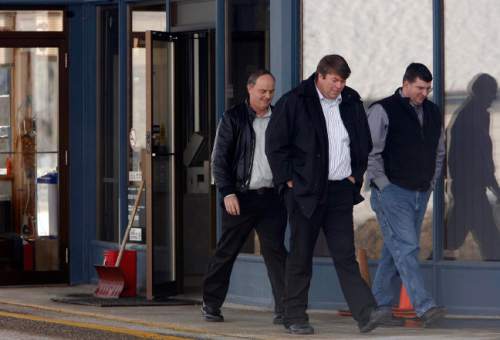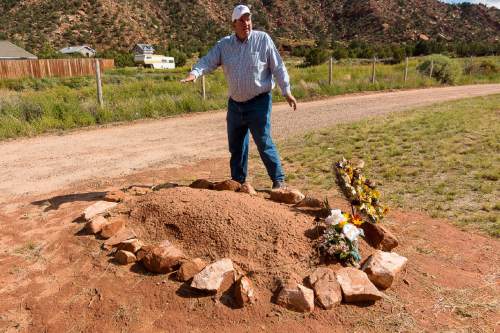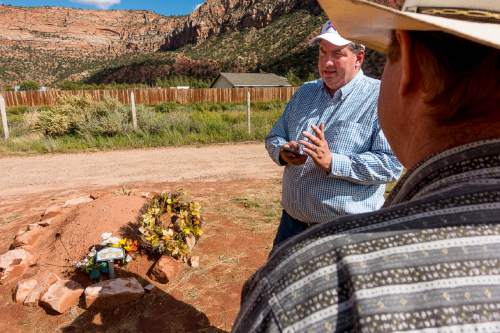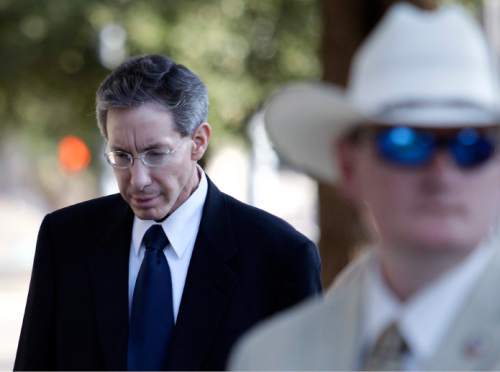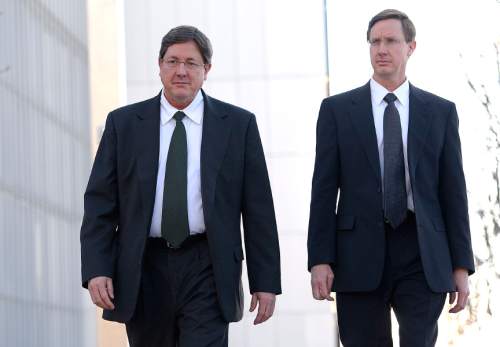This is an archived article that was published on sltrib.com in 2016, and information in the article may be outdated. It is provided only for personal research purposes and may not be reprinted.
Phoenix • An attorney for a Utah town on Thursday pressed a discrimination trial's first witness on whether he saw leaders of a polygamous church actually order town council members to make certain appointments.
No, testified the witness, Dowayne Barlow.
But he said all the members of the town councils in Hildale, Utah, and adjoining Colorado City, Ariz., and their utility boards belong to the Fundamentalist Church of Jesus Christ of Latter-Day Saints. And when someone resigns from those councils and boards, remaining members do not approve replacements without authorization from church leaders, Barlow explained.
"There's not one member of that community that would even go to that [open] position unless the church approved and validated it," Barlow testified.
Barlow testified for four hours on Wednesday about how the FLDS operated and how he saw officials from the towns and members of their police force participate in or ignore illegal activity.
On Thursday, Hildale attorney Blake Hamilton resumed his cross examination of Barlow and attacked his credibility. He accused Barlow of only inferring what was happening in the towns and pressed Barlow on whether the police force, called marshals, were as complicit in church matters as Barlow had said.
Hamilton also accused Barlow of lying about having been an assistant to FLDS Bishop Lyle Jeffs and asked if it was true that Jeffs didn't like Barlow because Barlow was taking up too much of the bishop's time.
"That is incorrect, Mr. Hamilton," Barlow replied.
Barlow couldn't point to a specific action that the towns' councils took to benefit the church, nor did he ever see the towns' officials or marshals participate in the misuse of food stamps. On Wednesday, Barlow had testified that the followers used food stamp debit cards at FLDS-controlled businesses but food really went to the FLDS storehouse, where the marshals and other FLDS followers picked up their groceries and other goods.
Hamilton suggested that Barlow opened construction businesses under other people's names and with other people's credit then left those people holding the debt when the businesses failed. Barlow said those people were his business partners and participants in the venture.
Barlow became expressive and later emotional when Hamilton asked about his departure from the FLDS in 2012 and why he left one of his children, a 7-month-old baby, in the care of the FLDS. Barlow said his family had been taken away from him after he separated from the church. He and his second plural wife opted to leave the child in the care of his wife's sister-in-law.
Barlow said the matter was complicated, but he and his second wife plan to pursue custody eventually. Barlow was excused after two more hours on the witness stand Thursday.
The U.S. Department of Justice is suing the municipal governments in Hildale and Colorado City, collectively known as Short Creek, for what it says is discrimination against people who do not follow the FLDS and its imprisoned leader, Warren Jeffs. Federal lawyers contend the municipal governments and the marshals take directives from Jeffs and ignore crimes committed by FLDS members.
Seven men and five women were picked Tuesday for a jury. The trial is expected to last four weeks.
Thursday's next witness was Isaac Wyler, who Warren Jeffs excommunicated from the FLDS with about 20 other men in a now-infamous church meeting on Jan. 10, 2004.
Wyler testified about how he was dubbed an apostate. People began vandalizing his home, horse pastures and vehicles in Colorado City. Water lines and fences were cut, he said. Vehicle tires were slashed many times, Wyler said, noting that in one month 28 tires were slashed or punctured.
He said he has reported "hundreds" of crimes to the marshals over the years, including thieves and vandals he caught in the act. He said the marshals have only arrested only one person — a juvenile who stole the tailgate off his pickup truck then put it on another truck — and cited one motorist with reckless driving after a truck ran him off the road.
Wyler said Short Creek appears to have a set of laws for the FLDS and another set for people who are not FLDS.
"I feel like my complaints just go to a bin that says 'garbage' on it," Wyler testified.
But the marshals have been willing to arrest and cite Wyler.
About 1 1/2 years after his excommunication, Wyler went to work for the United Effort Plan, the trust the state of Utah seized in 2005 and which owns most of the land and homes in Short Creek.
Wyler has served eviction notices on homes where the occupants weren't paying taxes or the trust's $100-a-month fees. Even though he had legal paperwork to conduct the evictions, the marshals once cited him for trespassing. He was found guilty in an Arizona municipal court and was sentenced to two years probation and a $400 fine.
Last month, the marshals arrested him and his videographer, who happens to be his girlfriend, as they were serving an eviction on another home. That case is pending.
But the marshals haven't arrested anybody for whom Wyler has reported for trespassing, Wyler testified.
In another episode, Wyler testified, someone cut a wire latching a gate and a horse escaped Wyler's pasture. When he couldn't find the horse, Wyler testified, he called the marshals office. He said no one there claimed to have seen it.
Three days later, he called the marshals again. This time, Wyler testified, someone told him the horse had been in the impound lot for three days and he owed $60 for its care. A marshal also cited Wyler for having an animal at large.
During a cross examination from Hamilton, Wyler acknowledged he didn't know whether it was prosecutors who opted not to pursue criminal charges against some of the suspects he reported.
Wyler also acknowledged he didn't remember FLDS leaders ever saying that the municipal governments were vehicles to further the work of the church.
"Warren Jeffs was not a Hildale employee, was he?" Hamilton asked.
"No, they work for him," Wyler replied.
Hildale Mayor Philip Barlow was in the courtroom Thursday. So was Jacob Jessop, an employee of Twin City Water Authority, which also is a defendant in the lawsuit. No other municipal officials or FLDS followers have been seen at court.
The trial is scheduled to resume Monday.
Twitter: @natecarlisle


